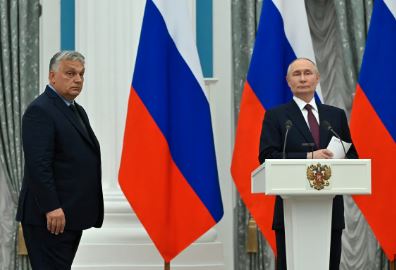Hungary’s Orban Holds Talks with Xi During Surprise Beijing Visit, Days After Meeting Putin

Hungarian Prime Minister Viktor Orban Meets Chinese Leader Xi Jinping Amid Controversial Diplomatic Moves
Hungarian Prime Minister Viktor Orban engaged in a significant diplomatic maneuver by meeting Chinese President Xi Jinping in Beijing, following recent visits to Moscow and Kyiv, which Orban characterized as a “peace mission.”
Orban, often criticized in Western circles for his pro-Russia stance amidst Moscow’s actions in Ukraine, shared a photo of his arrival at a Beijing airport with the caption “Peace mission 3.0” on social media platform X.
Discussions between Orban and Xi at the Diaoyutai State Guesthouse in Beijing centered on “in-depth communication” regarding the situation in Ukraine, according to a statement released by Chinese state broadcaster CCTV.
The timing of Orban’s unanticipated visit, just prior to the NATO summit in Washington, where US President Joe Biden will gather leaders to bolster support for Ukraine, underscores its geopolitical significance. Orban’s spokesperson indicated that Washington would be his next destination following Beijing.
China, recognized as Russia’s principal ally on the global stage, is likely to feature prominently on the NATO agenda, with concerns mounting over Beijing’s alleged facilitation of Moscow’s military efforts through economic and diplomatic channels.
Despite claims of neutrality in the conflict, China has positioned itself as a potential mediator for peace in Ukraine, aligning closely with Russian President Vladimir Putin since the onset of Moscow’s invasion more than two years ago. Their recent meeting in Kazakhstan during the Shanghai Cooperation Organization summit reinforced their strategic alliance.
During their talks, Xi reiterated China’s call for a ceasefire in Ukraine, although this stance has drawn criticism in the West for potentially legitimizing Russia’s territorial gains without prior withdrawal of its troops.
Orban, often regarded as Putin’s key ally within Europe, has advocated for a ceasefire over military intervention in Ukraine. He emphasized China’s pivotal role in fostering conditions for peace, underscoring the importance of his meeting with President Xi shortly after Xi’s official visit to Budapest two months ago.
Xi affirmed China and Hungary’s shared principles and efforts regarding Ukraine, indirectly referencing Beijing’s allegations that Western nations exacerbate the conflict by supplying weapons to Kyiv.
Orban’s diplomatic activities, including his recent visits to Moscow and Kyiv, coincide with Hungary’s assumption of the rotating presidency of the Council of the European Union—a role met with skepticism among EU leaders who view Orban as straying from liberal democratic norms.
The ongoing conflict in Ukraine, now in its third year since Russia’s full-scale invasion, continues to divide and concern European leaders. European Commission President Ursula von der Leyen criticized Orban’s Moscow visit, asserting that appeasement would not resolve the crisis, while emphasizing the need for EU unity and determination.
Orban’s discussions with Putin in Moscow, following his talks in Kyiv where he proposed ceasefire considerations, underscored Hungary’s attempts to influence peace negotiations, despite Ukraine’s insistence on territorial restoration as a precondition for any agreement.
Orban’s earlier meeting with Xi in May, which elevated Hungary-China relations to an “all-weather comprehensive strategic partnership,” received endorsement from Xi during their recent talks. Xi expressed hope that Hungary’s EU presidency would contribute positively to stable EU-China relations.
